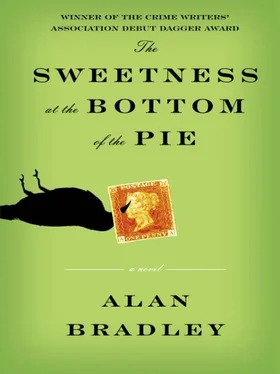Alan Bradley - The Sweetness at the Bottom of the Pie
Здесь есть возможность читать онлайн «Alan Bradley - The Sweetness at the Bottom of the Pie» весь текст электронной книги совершенно бесплатно (целиком полную версию без сокращений). В некоторых случаях можно слушать аудио, скачать через торрент в формате fb2 и присутствует краткое содержание. Жанр: Старинная литература, на английском языке. Описание произведения, (предисловие) а так же отзывы посетителей доступны на портале библиотеки ЛибКат.
- Название:The Sweetness at the Bottom of the Pie
- Автор:
- Жанр:
- Год:неизвестен
- ISBN:нет данных
- Рейтинг книги:3 / 5. Голосов: 1
-
Избранное:Добавить в избранное
- Отзывы:
-
Ваша оценка:
- 60
- 1
- 2
- 3
- 4
- 5
The Sweetness at the Bottom of the Pie: краткое содержание, описание и аннотация
Предлагаем к чтению аннотацию, описание, краткое содержание или предисловие (зависит от того, что написал сам автор книги «The Sweetness at the Bottom of the Pie»). Если вы не нашли необходимую информацию о книге — напишите в комментариях, мы постараемся отыскать её.
The Sweetness at the Bottom of the Pie — читать онлайн бесплатно полную книгу (весь текст) целиком
Ниже представлен текст книги, разбитый по страницам. Система сохранения места последней прочитанной страницы, позволяет с удобством читать онлайн бесплатно книгу «The Sweetness at the Bottom of the Pie», без необходимости каждый раз заново искать на чём Вы остановились. Поставьте закладку, и сможете в любой момент перейти на страницу, на которой закончили чтение.
Интервал:
Закладка:
"Rank poisons," Lavoisier called them, but I reveled in the recitation of their names like a hog at a spa.
"King's yellow!" I said aloud, rolling the words round in my mouth—savoring them in spite of their poisonous nature.
"Crystals of Venus! Fuming Liquor of Boyle! Oil of Ants!"
But it wasn't working this time; my mind kept flying back to Father, thinking over and over about what I had seen and heard. Who was this Twining—“Old Cuppa”—the man Father claimed they had killed? And why had Father not appeared at breakfast? That had me truly worried. Father always insisted that breakfast was “the body's banquet,” and to the best of my knowledge, there was nothing on earth that would compel him to miss it.
Then, too, I thought of the passage from Dickens that Daphne had read to us: the bruises blue and green. Had Father fought with the stranger and suffered wounds that could not be hidden at the table? Or had he suffered those injuries to the insides described by Fanny Squeers: injuries that left no external marks of violence. Perhaps that was what had happened to the man with the red hair. Which should explain why I had seen no blood. Could Father be a murderer? Again?
My head was spinning. I could think of nothing better to calm it down than the Oxford English Dictionary. I fetched down the volume with the V s. What was that word the stranger had breathed in my face? “ Vale "! That was it.
I flipped the pages: vagabondical… vagrant… vain… here it was: vale: Farewell; good-bye; adieu. It was pronounced val-eh , and was the second person singular imperative of the Latin verb valere , to be well.
What a peculiar thing for a dying man to say to someone he didn't know.
A sudden racket from the hall interrupted my thoughts. Someone was giving the dinner gong a great old bonging. This huge disk, which looked like a leftover from the opening of a film by J. Arthur Rank, had not been sounded for ages, which could explain why I was so startled by its shattering noise.
I ran out of the laboratory and down the stairs to find an oversized man standing at the gong with the striker still in his hand.
"Coroner," he said, and I took it he was referring to himself. Although he did not trouble to give his name, I recognized him at once as Dr. Darby, one of the two partners in Bishop's Lacey's only medical practice.
Dr. Darby was the spitting image of John Bull: red face, multiple chins, and a stomach that bellied out like a sail full of wind. He was wearing a brown suit with a checked yellow waistcoat, and he carried the traditional doctor's black bag. If he remembered me as the girl whose hand he had stitched up the year before after the incident with a wayward bit of laboratory glassware, he gave no outward sign but stood there expectantly, like a hound on the scent.
Father was still nowhere in sight, nor was Dogger. I knew that Feely and Daffy would never condescend to respond to a bell (“So utterly Pavlovian,” Feely said), and Mrs. Mullet always kept to her kitchen.
"The police are in the garden," I told him. "I'll show you the way."
As we stepped out into the sunshine, Inspector Hewitt looked up from examining the laces of a black shoe that protruded rather unpleasantly from the cucumbers.
"Morning, Fred," he said. "Thought you'd best come have a look."
"Um," Dr. Darby said. He opened his bag and rummaged inside for a moment before pulling out a white paper bag. He reached into it with two fingers and extracted a single crystal mint, which he popped into his mouth and sucked with noisy relish.
A moment later he had waded into the greenery and was kneeling beside the corpse.
"Anyone we know?" he asked, mumbling a bit round the mint.
"Shouldn't seem so," Inspector Hewitt said. "Empty pockets. no identification. reason to believe, though, that he's recently come from Norway."
Recently come from Norway? Surely this was a deduction worthy of the great Holmes himself—and I had heard it with my own ears! I was almost ready to forgive the Inspector his earlier rudeness. Almost… but not quite.
"We've launched inquiries, ports of call and so forth."
"Bloody Norwegians!" said Dr. Darby, rising and closing his bag. "Flock over here like birds to a lighthouse, where they expire and leave us to mop up. It isn't fair, is it?"
"What shall I put down as the time of death?" Inspector Hewitt asked.
"Hard to say. Always is. Well, not always, but often."
"Give or take?"
"Can't tell with cyanosis: takes a while to tell if it's coming or going, you know. Eight to twelve hours, I should say. I'll be able to tell you more after we've had our friend up on the table."
"And that would make it.?"
Dr. Darby pushed back his cuff and looked at his watch.
"Well, let me see. it's eight twenty-two now, so that makes it no sooner than about that same hour last evening and no later than, say, midnight."
Midnight! I must have audibly sucked in air, since both Inspector Hewitt and Dr. Darby turned to look at me. How could I tell them that, just a few hours ago, the stranger from Norway had breathed his last breath into my face?
The solution was an easy one. I took to my heels. I found Dogger trimming the roses in the flower bed under the library window. The air was heavy with their scent: the delicious odor of tea chests from the Orient.
"Father not down yet, Dogger?" I asked.
"Lady Hillingdons are especially fine this year, Miss Flavia," he said, as if ice wouldn't melt in his mouth; as if our furtive encounter in the night had never taken place. Very well, I thought, I'll play his game.
"Especially fine," I said. "And Father?"
"I don't think he slept well. I expect he's having a bit of a lie-in."
A lie-in? How could he be back in bed when the place was alive with the law?
"How did he take it when you told him about the—you know—in the garden?"
Dogger turned and looked me directly in the eye. “I didn't tell him, miss.”
He reached out and with a sudden snip of his secateurs, pruned a less-than-perfect bloom. It fell with a plop to the ground, where it lay with its puckered yellow face gazing up at us from the shadows.
We were both of us staring at the beheaded rose, thinking of our next move, when Inspector Hewitt came round the corner of the house.
"Flavia," he said, "I'd like a word with you."
"Inside," he added.
4
"AND THE PERSON OUTSIDE TO WHOM YOU WERE speaking?” Inspector Hewitt asked.
"Dogger," I said.
"First name?"
"Flavia," I said. I couldn't help myself.
We were sitting on one of the Regency sofas in the Rose Room. The Inspector slapped down his Biro and turned at the waist to face me.
"If you are not already aware of it, Miss de Luce—and I suspect you are—this is a murder investigation. I shall brook no frivolity. A man is dead and it is my duty to discover the why, the when, the how, and the who. And when I have done that, it is my further duty to explain it to the Crown. That means King George the Sixth, and King George the Sixth is not a frivolous man. Do I make myself clear?"
"Yes, sir," I said. "His given name is Arthur: Arthur Dogger."
"And he's the gardener here at Buckshaw?"
"He is now, yes."
The Inspector had opened a black notebook and was taking notes in a microscopic hand.
"Was he not always?"
"He's a jack-of-all-trades," I said. "He was our chauffeur until his nerve gave out."
Even though I looked away, I could still feel the intensity of his detective eye.
"The war," I said. "He was a prisoner of war. Father felt that. he tried to—"
"I understand," Inspector Hewitt said, his voice gone suddenly soft. "Dogger's happiest in the garden."
Читать дальшеИнтервал:
Закладка:
Похожие книги на «The Sweetness at the Bottom of the Pie»
Представляем Вашему вниманию похожие книги на «The Sweetness at the Bottom of the Pie» списком для выбора. Мы отобрали схожую по названию и смыслу литературу в надежде предоставить читателям больше вариантов отыскать новые, интересные, ещё непрочитанные произведения.
Обсуждение, отзывы о книге «The Sweetness at the Bottom of the Pie» и просто собственные мнения читателей. Оставьте ваши комментарии, напишите, что Вы думаете о произведении, его смысле или главных героях. Укажите что конкретно понравилось, а что нет, и почему Вы так считаете.












